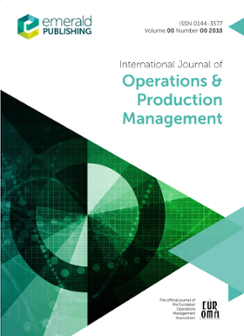Exploring the application of blockchain to humanitarian supply chains: insights from Humanitarian Supply Blockchain pilot project
IF 7.1
2区 管理学
Q1 MANAGEMENT
International Journal of Operations & Production Management
Pub Date : 2021-07-20
DOI:10.1108/IJOPM-12-2020-0884
引用次数: 30
Abstract
PurposeSome studies and reports have recently suggested using blockchain technology to improve transparency and trust in humanitarian supply chains (HSCs). However, evidence-based studies to display the utility and applicability of blockchains in HSCs are missing in the literature. This paper aims to investigate the key drivers and barriers of blockchain application to HSCs and explore whether evidence could support that the application of blockchain improves transparency and trust in HSCs.Design/methodology/approachThis paper puts forward a two-stage approach to explore the blockchain application in HSCs: an initial exploration of humanitarian practitioners and academicians interested in blockchain through focus group discussions; semi-structured interviews with practitioners involved at the UK Department for International Development's Humanitarian Supply Blockchain pilot project.FindingsFirst, we found that main drivers include accountability, visibility, traceability, trust, collaboration, time efficiency, reducing administrative work and cross-sector partnership. Main barriers, however, are composed of engagement issues, lack of technical skills and training, lack of resources, privacy concerns, regulatory problems, pilot scalability issues and governance challenges. Second, evidence from our case study revealed the blockchain application could have added value to improve visibility and traceability, thus contributing to improve transparency. Concerning trust, evidence supports that blockchain could enhance both commitment and swift trust in the pilot study.Practical implicationsOur study contributes to a more understanding of added values and challenges of blockchain application to HSCs and creates a perspective for humanitarian decision-makers.Originality/valueThis study provides the first evidence from the actual application of blockchain technology in HSCs. The study discovered that it is still less evident in many humanitarian organizations, including medium- and small-sized nongovernmental organizations, that they engage in a direct deployment of in-house or customized blockchain-based HSC. Instead, these actors are more likely to indirectly use blockchain in HSCs through a private commercial partner.探索区块链在人道主义供应链中的应用:来自人道主义供应区块链试点项目的见解
一些研究和报告最近建议使用区块链技术来提高人道主义供应链(hsc)的透明度和信任度。然而,文献中缺乏显示区块链在造血干细胞中的实用性和适用性的循证研究。本文旨在研究区块链应用于造血干细胞的关键驱动因素和障碍,并探讨是否有证据支持区块链的应用提高了造血干细胞的透明度和信任度。本文提出了一个两阶段的方法来探索区块链在hsc中的应用:通过焦点小组讨论对区块链感兴趣的人道主义从业者和学者进行初步探索;与参与英国国际发展部人道主义供应区块链试点项目的从业人员进行的半结构化访谈。首先,我们发现主要驱动因素包括问责制、可见性、可追溯性、信任、协作、时间效率、减少行政工作和跨部门伙伴关系。然而,主要障碍包括参与问题、缺乏技术技能和培训、缺乏资源、隐私问题、监管问题、试点可扩展性问题和治理挑战。其次,来自我们案例研究的证据表明区块链应用程序可以为改进可见性和可追溯性增加价值,从而有助于提高透明度。在信任方面,在试点研究中,证据支持b区块链可以同时增强承诺和快速信任。我们的研究有助于更好地理解区块链应用于hsc的附加价值和挑战,并为人道主义决策者提供了一个视角。原创性/价值本研究为区块链技术在造血干细胞中的实际应用提供了第一个证据。该研究发现,在许多人道主义组织(包括中小型非政府组织)中,他们直接部署内部或定制的基于区块链的HSC的情况仍然不太明显。相反,这些参与者更有可能通过私人商业合作伙伴间接在造血干细胞中使用区块链。
本文章由计算机程序翻译,如有差异,请以英文原文为准。
求助全文
约1分钟内获得全文
求助全文
来源期刊
CiteScore
13.30
自引率
17.20%
发文量
96
期刊介绍:
The mission of the International Journal of Operations & Production Management (IJOPM) is to publish cutting-edge, innovative research with the potential to significantly advance the field of Operations and Supply Chain Management, both in theory and practice. Drawing on experiences from manufacturing and service sectors, in both private and public contexts, the journal has earned widespread respect in this complex and increasingly vital area of business management.
Methodologically, IJOPM encompasses a broad spectrum of empirically-based inquiry using suitable research frameworks, as long as they offer generic insights of substantial value to operations and supply chain management. While the journal does not categorically exclude specific empirical methodologies, it does not accept purely mathematical modeling pieces. Regardless of the chosen mode of inquiry or methods employed, the key criteria are appropriateness of methodology, clarity in the study's execution, and rigor in the application of methods. It's important to note that any contribution should explicitly contribute to theory. The journal actively encourages the use of mixed methods where appropriate and valuable for generating research insights.

 求助内容:
求助内容: 应助结果提醒方式:
应助结果提醒方式:


